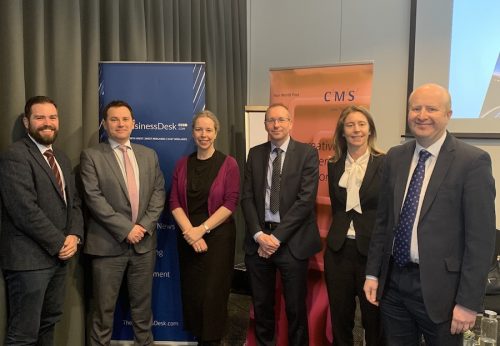The challenges and opportunities on infrastructure investment

2019 was an interesting year for investment, particularly in infrastructure.
In a 12 months that were characterised by political uncertainty in the UK it’s clear from the latest Infrastructure Index by international law firm CMS that the investment market was hit.

This was one of the questions answered at our recent breakfast seminar “Getting Yorkshire’s infrastructure fit for the future”, sponsored by CMS.
Fraser Askham, partner at CMS, started by saying: “I’m not particularly convinced that the political uncertainty has been the major obstacle to investment in our region. There are however some pretty fundamental challenges that still remain about how government make decisions about infrastructure investments.
“For instance using the example of the cost benefit analysis; firstly it isn’t consistently applied; secondly projects in the North tend to take longer to deliver meaning the cost benefit can slip, providing an excuse not to deliver, and finally it takes into account wages, house prices, land values – which will always skew the data against the North.”
The other major topic disrupting infrastructure must be climate change.
Ben Still, managing director of the West Yorkshire Combined Authority, added: “Brexit uncertainty has dominated Government. However, there are some things 
Still however countered that although the Government might have the ambition with regards to the low carbon agenda, he wasn’t certain they had grasped the financial cost. He added: “The sums of money that we believe will be required to decarbonise energy supply to improve energy efficiency of the housing stock, just within West Yorkshire and the city region is eye-watering.”
Tom Bridges, Leeds office leader and director of cities advisory at Arup, added: “The challenge at present is to turn the talk around net zero, whether it’s by 2050 or 2045 into tangible, realistic investment proposals and projects that can be taken forward.” He also highlighted the opportunity particularly in Yorkshire, where projects such as the district heating scheme is already on – or rather in – the ground in Leeds and the opportunities of offshore wind and the wider supply chain which have benefited Hull and the Humber.
However the chartered town planner also highlighted that we need to make a decision about the future of nuclear in the region. He said: “It’s difficult to see how we can meet those climate change trajectories [in the region] without some new nuclear, however the economics of it appear challenging.”

Bridges added: “With government phasing out petrol vehicles fairly soon, not too long beyond the next decade, the issue of getting ready for electric vehicles is a now question not a future one.”
N.B. Since this event the Chancellor of the Exchequer announced during his first budget a new £500m funding pot, to be spent over the next five years designed to increase the country’s rapid charging network for electric vehicles, so that drivers are never more than 30 miles away from a rapid charging point.
However, beyond infrastructure for vehicles and power there is also a role within the climate change agenda for better digital connectivity. Kim Johnston, city manager for CityFibre, commented: “Climate change is having a physical impact on our county. Looking at the recent flooding across Yorkshire and the rest of the UK and you can see how having access to 5G and full fibre which connect to sensors in the ground provides the potential to recognise when there’s a problem way before it happens.”
So is climate change impacting how people are planning and developing infrastructure? Ben Still says simply “no”. He said: “We still need roads and the North has suffered from underinvestment in its road network for decades. The future low carbon vehicles, cyclists and public transport all needs good road infrastructure. So we shouldn’t just lurch towards a ‘we must stop road building’, instead we need to think carefully about what is the right approach.”
It is clear that climate change, rightly so, is high on the global agenda and it’s only right that it should feed into the consideration of infrastructure investment. However, as much as it’s a challenge for Yorkshire it also holds a number of opportunities.








